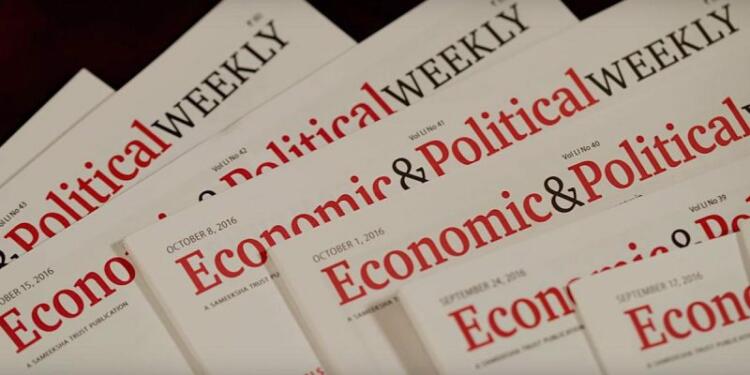- EPW is so blind in its propaganda that it ignores all the empirical data to criticize the Modi government.
- The publication pursues political goals in collaboration with organizations like Nobel Committee.
- The organizations like EPW and Nobel Committee collaborate in order to mainstream the leftist economic thought in India.
Economic and Political Weekly (EPW), a magazine and research journal published in Mumbai, is the most influential voice in Indian academic publications. Dominated by hardcore leftists who alleged even Indira Gandhi to be a voice of the right, the publication is polluting the mindset of Indian academia, especially the social sciences stream people, through propaganda. And given its influence in academia, the lies and propaganda of EPW need to be countered.
EPW is so blind in its propaganda that it ignores all the empirical data to criticize the Modi government. In a recent editorial on budget, the publication called the spending on infrastructure development to spur economic growth a “gamble” while the evidence from post-WW II Western Europe and 1980s China suggest the contrary.
“Higher allocations for a few infrastructure sectors will not kick-start a virtuous cycle of investments,” argues the editorial of EPW. EPW’s commentary supports the ‘povertarian’ economics that kept India poor for decades, and it has such a stronghold as the representative of Indian academia that for any work of India to be recognized globally needs to be published in EPW.
The publication pursues political goals in collaboration with organizations like Nobel Committee. EPW has ensured that the Nobel Prize for any work on India or by Indian academics goes to people published in the journal and Nobel Committee, which usually honours free-market economists from the West, honours the award to leftists in India.
Modi government came to power in 2014 with the promise of ‘development’. He was very clear that ‘Government has no business to do business, and has a history of pro-market policies in Gujarat. The Nobel Committee awarded the prize to Angus Deaton “for his analysis of consumption, poverty, and welfare”.
Deaton’s work has been primarily centred on ‘poverty’ in India and he has been regularly published in EPW, the most prominent left-wing research magazine cum journal of the country.
Modi government was re-elected with an even larger majority in May 2019 and the government has taken some serious steps toward privatization. And after that, Abhijit Banerjee was conferred with the prize, giving a new messiah to Indian leftists. Banerjee’s Mother and Father, both prominent left-wing economists in Communist West Bengal, have regularly published in the Economic and Political Weekly.
One wonders why no free-market fundamentalist from India has been honoured with Nobel Prize yet. Jagdish Bhagwati, Arvind Panagariya, Raghuram Rajan, Meghnad Desai, Arvind Subramanian are some of the economists who had made exceptional contributions to market economics. But the Nobel Committee chooses to ignore all these folks.
Paul Krugman, one of Bhagwati’s students, won the prize in 2008. Krugman won for his analysis of trade patterns and the location of economic activity. The majority of Krugman’s work was based on Bhagwati’s earlier research but the Indian American economist was not made a joint awardee.
The question is why the Nobel Prize committee does not want India to embrace free-market policies which made the West rich. Why does the committee gives free publicity to left-wing economics by conferring Nobel Prize while market fundamentalists like Jagdish Bhagwati are ignored?
The organizations like EPW and Nobel Committee collaborate in order to mainstream the leftist economic thought in India. Many ignorant and underemployed academics and journalists fall for the propaganda, ignoring the lack of empirical evidence in its editorials and research articles. The budget editorial is the best example of how EPW ignores the empirical evidence from countries around the world in order to criticize the Modi government.





























